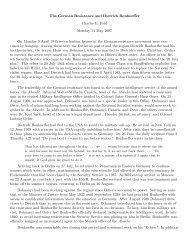Dietrich Bonhoeffer a discussion of the film Bonhoeffer: Agent of ...
Dietrich Bonhoeffer a discussion of the film Bonhoeffer: Agent of ...
Dietrich Bonhoeffer a discussion of the film Bonhoeffer: Agent of ...
Create successful ePaper yourself
Turn your PDF publications into a flip-book with our unique Google optimized e-Paper software.
The image <strong>of</strong> <strong>the</strong> resistance attracted to Jesus Christ must have suggested a parallel with<br />
<strong>the</strong> attraction <strong>of</strong> gentiles to <strong>the</strong> early Church. The Apostle Paul had analyzed this situation by<br />
examining for <strong>the</strong> people <strong>of</strong> Israel <strong>the</strong> relationship between <strong>the</strong> promises <strong>of</strong> <strong>the</strong> Fa<strong>the</strong>r and <strong>the</strong><br />
ceremonial law, especially circumcision. They were a “guardian” for Israel in her youth until she<br />
actually received what was already hers by promise. With <strong>the</strong> advent <strong>of</strong> Jesus Christ, Israel had<br />
reached maturity and <strong>the</strong> “guardian” <strong>of</strong> circumcision and <strong>the</strong> ceremonial law were set aside.<br />
Though <strong>the</strong> analogy is imperfect, <strong>Bonhoeffer</strong> cited <strong>the</strong> Apostle Paul’s understanding <strong>of</strong> circumcision<br />
as his model. He began to look for evidence <strong>of</strong> a coming <strong>of</strong> maturity in <strong>the</strong> Western<br />
world, which he described as “a world come <strong>of</strong> age.” He also looked for aspects <strong>of</strong> Christianity<br />
that had served as “guardians” <strong>of</strong> <strong>the</strong> West during its immature stages. These he categorized as<br />
“religion.” Just as Paul had announced <strong>the</strong> replacement <strong>of</strong> <strong>the</strong> “religious” rite <strong>of</strong> circumcision<br />
with “real circumcision [which] is a matter <strong>of</strong> <strong>the</strong> heart, spiritual and not literal” (Romans 2:29),<br />
<strong>Bonhoeffer</strong> began to look for “nonreligious interpretations” for Christian concepts. Having begun<br />
this task only at <strong>the</strong> end <strong>of</strong> April 1944, however, <strong>Bonhoeffer</strong> had not been able to get very far, at<br />
least in any <strong>of</strong> his writings that survive, as he himself acknowledged.<br />
“While <strong>Bonhoeffer</strong> developed his ideas on <strong>the</strong> nonreligious interpretation <strong>of</strong> Christianity in<br />
a world come <strong>of</strong> age, he never considered abandoning his connection with <strong>the</strong> traditional words<br />
and customs <strong>of</strong> <strong>the</strong> church.” This statement by Bethge is confirmed in <strong>Bonhoeffer</strong>’s writings by<br />
<strong>the</strong> continued use <strong>of</strong> traditional scriptural language, especially after <strong>the</strong> failure <strong>of</strong> <strong>the</strong> assassination<br />
attempt. These last writings are, in my opinion, among his clearest. Here is one <strong>of</strong> several<br />
statements from that last period, formulated in traditional Christian language.<br />
I am so sure <strong>of</strong> God’s guiding hand that I hope I shall always be kept in that certainty. You<br />
must never doubt that I’m traveling with gratitude and cheerfulness along <strong>the</strong> road where I’m<br />
being led. My past life is brim-full <strong>of</strong> God’s goodness and my sins are covered by <strong>the</strong> forgiving<br />
love <strong>of</strong> Christ crucified. I’m most thankful for <strong>the</strong> people I have met, and I only hope that<br />
<strong>the</strong>y never have to grieve about me, but that <strong>the</strong>y, too, will always be certain <strong>of</strong>, and thankful<br />
for, God’s mercy and forgiveness.<br />
It is language like this that made a powerful impact on <strong>the</strong> people who knew <strong>Bonhoeffer</strong>,<br />
and on <strong>the</strong> many who have read his writings. Jones and Till have included very little <strong>of</strong> this language<br />
in <strong>the</strong>ir screenplay. As a result, <strong>the</strong> <strong>film</strong> fails to portray <strong>of</strong> <strong>the</strong> power <strong>of</strong> <strong>Dietrich</strong> <strong>Bonhoeffer</strong>’s<br />
Christian witness and martyrdom.<br />
Conclusion<br />
Although <strong>the</strong>y were important to him in <strong>the</strong> early 1930s, in <strong>Bonhoeffer</strong>’s collected works<br />
<strong>the</strong>re are fewer than 10 references to Frank Fisher and <strong>the</strong> Harlem church and fewer than 20 to<br />
Gandhi. At <strong>the</strong> o<strong>the</strong>r end <strong>of</strong> <strong>the</strong> scale are <strong>the</strong> two people with <strong>the</strong> greatest number <strong>of</strong> references<br />
in <strong>Bonhoeffer</strong>’s writings, with more than 600 each – Eberhard Bethge and Martin Lu<strong>the</strong>r. One<br />
plays little, <strong>the</strong> o<strong>the</strong>r no role in <strong>the</strong> <strong>film</strong>. Frank Fisher, whom <strong>Dietrich</strong> knew as a seminarian in<br />
<strong>the</strong> USA in 1930-1931, is <strong>the</strong> only <strong>the</strong>ological figure in <strong>the</strong> <strong>film</strong> with whom <strong>Dietrich</strong> converses.<br />
The <strong>film</strong> presents no <strong>the</strong>ological interaction with Eberhard Bethge, <strong>the</strong> individual who was personally<br />
<strong>the</strong> most important figure in <strong>Dietrich</strong>’s <strong>the</strong>ological life. <strong>Dietrich</strong> is presented as making<br />
almost as many references to Gandhi as to Jesus Christ. No o<strong>the</strong>r <strong>the</strong>ological figure is even mentioned.<br />
In particular, <strong>the</strong> <strong>film</strong> makes no mention <strong>of</strong> Martin Lu<strong>the</strong>r, <strong>the</strong> <strong>the</strong>ologian who had <strong>the</strong><br />
greatest impact on <strong>Bonhoeffer</strong>.<br />
12



